The Islamic State (also known as the Islamic State of Iraq and Syria, or ISIS) is fast emerging as the first supranational extremist structure performing state-like functions while controlling swaths of territory belonging to multiple states. This feat is something that even Al-Qaeda, whose modus operandi was limited to that of a mobile, covert and transnational terrorist outfit, could not accomplish. In comparison to the Taliban, ISIS is more ruthless and barbaric, and its hierarchical command structure and recruitment strategies can stimulate the former to evolve in dangerous ways. Thus the possibility of both competition and collaboration between these two entities in Pakistan is a real threat.
ISIS’s aggression is unmatched when it comes to committing grave violations of human rights. The outfit brazenly disregards human life in a customary manner under the rubric of the Islamic Caliphate. It openly carries out acts of rape, sex slavery, forced conversions, and the mass execution of minorities and armed personnel. ISIS has carried out beheadings even when its own Sharia courts have declared those murdered as innocent. This exposes the hypocrisy of the group and undermines its legitimacy from within.
While both ISIS and the Taliban have an obsession with decapitations, again it is ISIS that has shown greater brutality when it regularly beheads soldiers, civilians, journalists, aid workers and even children. These acts are flagrant violations of international humanitarian law and clearly constitute crimes against humanity and war crimes under international criminal law.
Under the law of nations, certain minimum human rights protections have to be extended to all persons in all circumstances, whether in times of peace or in times of war. These protections are enumerated in all four Geneva Conventions and prohibit murder of all kinds, mutilation, torture, cruel, humiliating and degrading treatment, and “the passing of sentences and the carrying out of executions without previous judgment pronounced by a regularly constituted court affording all the judicial guarantees, which are recognized as indispensable by civilized peoples.”
Further, captured members of the armed forces and associated units of any state by ISIS enjoy combatant immunity and cannot be tried or punished for legitimate fighting. While combatants can be tried if they act in violation of the law of armed conflict, non-state terrorist outfits like ISIS absolutely lack any legal authority under international law to prosecute the captured even if they wanted to do so. In any event, summary executions carried out through beheadings by non-state militant outfits like ISIS and the Taliban qualify as war crimes and are punishable by the International Criminal Court once this apex court’s jurisdiction is established.
Under Islamic Law, ISIS can be guilty of committing serious crimes that disrupt public order and stability in an Islamic state. The crime of terrorism is broadly defined under Islamic jurisprudence and is subsumed under the doctrine of “Hirabah.” Hirabah hinges on spreading fear and helplessness through terrorism and criminal acts, which qualify as incitement to social disorder; it is one of the most serious and severely punished offenses under Islam. Additionally, the doctrine of “Baghy” entitles the state to target and use lethal force against rebels while a rebellion is ongoing against an Islamic regime. Baghy and Hirabah are not mutually exclusive doctrines and ISIS can be punished or targeted for indulging in both activities respectively.
Public criticism of ISIS in Islamic states that have not been directly impacted by the conflict has been rather muted. This is surprising, considering the fact that the brunt of the damage inflicted by ISIS has been borne by Islamic states and their populaces. Are people unaware of the brutality of ISIS? Do they erroneously believe that the group is fighting against what is perceived as Western imperialism? Or are they mesmerized by the allure of a utopian Islamic Caliphate? ISIS is ideologically opposed to the Westphalian nation state. For ISIS, Pakistan is not an entity in existence, but its territory is part of the greater Khorasan Ayalat (province). It is a fact, however, that all Islamic nations are organized as nation-states, each treasuring and guarding its sovereignty with the overwhelming support of its citizenry.
Muslims all over the world, whether as majority or minority populations, prescribe to the rule of law and ascribe to fundamental human rights. The modern nation-state enjoys complete legitimacy and recognition in the Muslim world. Supporting the nation-state does not make one a religious apologist. Pakistan is already fighting a costly battle against Al-Qaeda and the Taliban on its territory. It cannot afford to let ISIS join in this fight. These transnational outfits challenge both the sovereignty and the ideological basis of states like Pakistan, Iraq, Syria. The public must realize that any sympathy or support for such groups is self-defeating.
Professor Sikander Shah is the former Legal Advisor to the Ministry of Foreign Affairs, Pakistan, and author of the book: International Law and Drone Strikes in Pakistan: The Legal and Socio-Political Aspects.

































